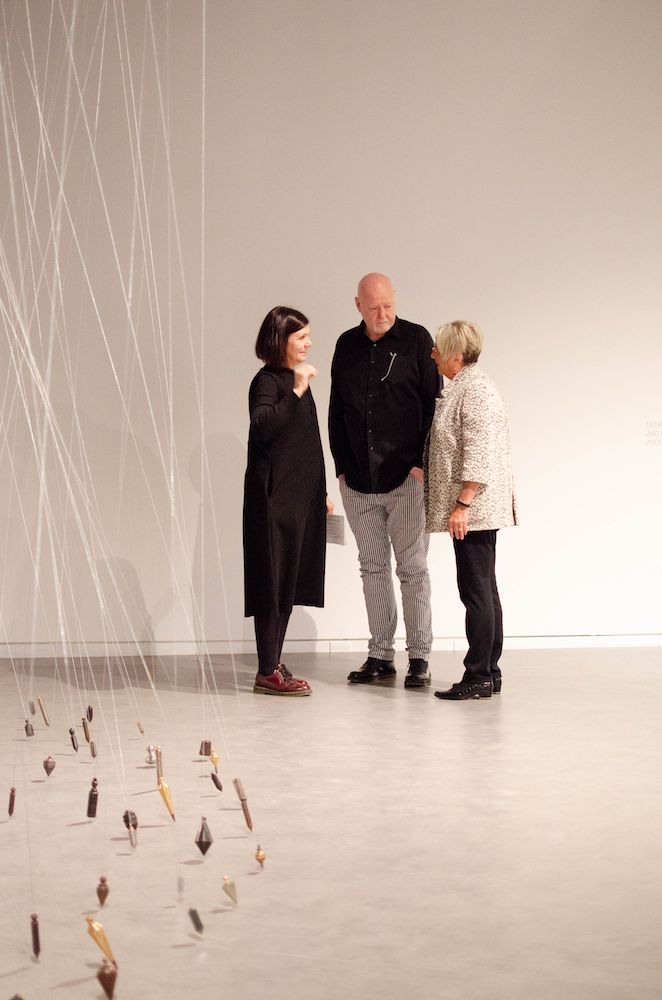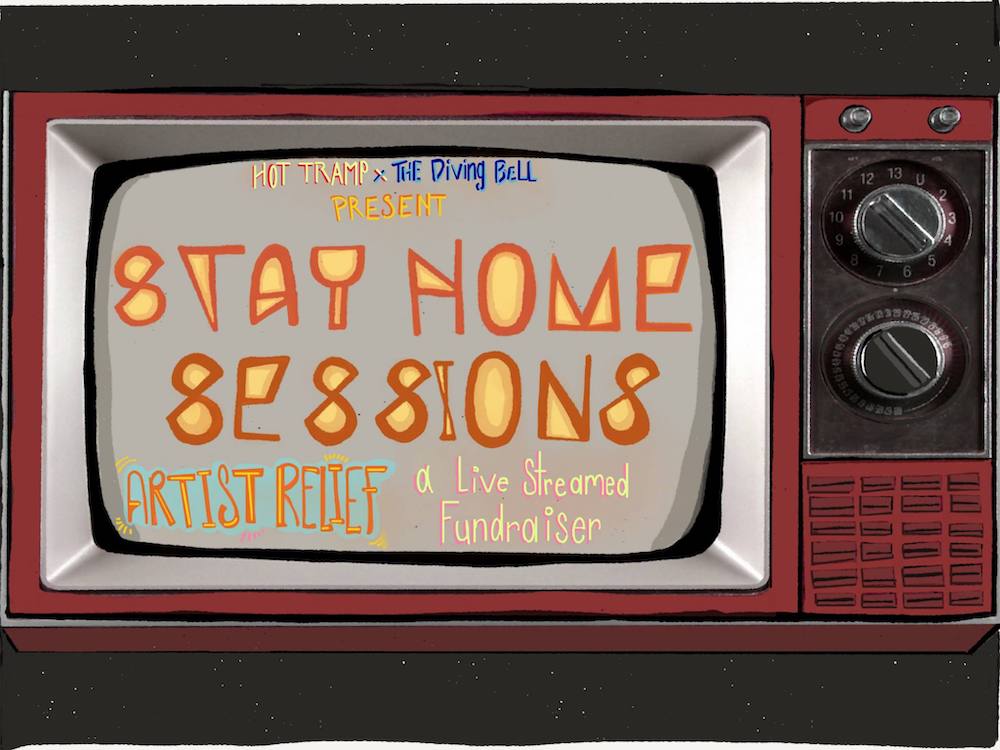Players gotta play, organizers gotta org.
With many artists stepping up online — giving concerts, readings, gallery tours and the like — it’s easy to forget the people behind the scenes, those who make cultural happenings actually happen. Across Canada, arts administrators, event organizers and cultural workers of all stripes are working hard to deliver the arts to our home screens.
In B.C., a number of initiatives have sprung up, offering online film, music, theatre, and literary events.
In Montreal, a recent concert series called the Stay Home Sessions offered live music in an innovative fashion, driving musicians to a closed set (meaning no audience), recording the shows and providing some sparks of joy along the way. The recorded performances are available to watch online.
Organized by the Diving Bell Social Club in Montreal, the series was inspired by the “complete closure of all music venues in Montreal,” said club booker and founder of Hot Tramp Management, Sarah Armiento. “We wanted to get it going as a way to keep live music events in the community and also as a way to continue supporting our venues and artists.”
Performers included a variety of local acts including the band Laps and solo performers Hanorah, Janette King and Meggie Lennon.
In event planning, anticipating problems and troubleshooting is key. In a pandemic, it becomes critical. Armiento explains how the organizers went to great lengths to reduce the risk as much as possible.
“It was definitely ‘extreme show planning.’ We had to break it down by the minute to ensure there was no band crossover,” she says. “We arranged band pickups to those who couldn’t walk to the space to make sure no one was using transit/cabs; we had to scrub down between each performance. We kept it so that at any given time, there was no more than two people in the venue with the performer.”
The series also concentrated on helping people who were most affected by the impact of COVID-19. “I tried to choose acts that were hit hard by show and tour cancellations,” says Armiento.
Nora Kelly, whose band Dishpit played the series, had only good things to say about her experience.
“The show was a totally wild. Six bands played, but at any given time only one band, the sound person, the organizer and a cameraman. We arrived at the very end of the night and were met with elbow high-fives, the new quarantine version of a handshake. I’ve never played a show without an audience, but I think we all felt less nervous because of it. [Dishpit’s drummer] Ethan brought an electronic drum pad with samples of an audience cheering and booing, and he had fun cueing those sound effects, along with a few other ones.”
“At one point, I did a Sarah McLachlan-style PSA to ‘support innocent musicians,’ telling an empty room that if they donated, they could provide ‘guitar tuners, patch chords and egg-shakers’ to those in need. Afterwards, we could re-watch the stream and see everyone’s comments during the show.”
(Oh, by the way, Nora Kelly is the daughter of a Tyee editor, which is how we learned about the online concert.)
Although the series proved a success, Armiento plans on doing things differently going forward.
“Lessons learned — [the series] happened weeks ago, and now with the max two-person gathering and the progression of COVID-19 in Montreal, we cannot do it. We took extreme safety precautions while putting this together, but next time we will need to make it 100-per-cent remote rather than filming it from our empty venue. We actually came up with a pretty great idea for Stay Home Sessions #2, but we are testing it out Saturday, so stay tuned for updates.”
But online shows cost money. Fundraising campaigns, both big and small, have been launched to support the cultural community.
The BC Arts Council created a $3-million Arts and Culture Resilience Supplement to be shared by artists and art workers suffering from the impacts of COVID-19. Starting this month, the council is granting recipients a 50-per-cent advance on 2020-21 funding to help with their cash flow.
As well, the Canada Council for the Arts announced $60 million in grants and funding for cultural groups across the country. And the City of Vancouver voted to release funding early for arts organizations hit hard by the pandemic, providing just over $6 million to 208 different groups. This amount pales in comparison to other cities such as Berlin, which committed 500 million euros directly to artists and freelancers.
Even smaller acts of generosity can have a big impact.
In Vancouver, a GoFundMe campaign was launched by the Canadian Cinema Worker Fund to help hourly workers who’ve been laid off, including the concession attendants, cashiers, projectionists and ushers who make cinematic experiences happen.
Michael Scoular, front-of-house manager at Vancity Theatre, initiated the idea and Mike Archibald, a long-time pillar of the Vancouver cinema community, joined the effort.
“The experience of the big screen is a major part of my life,” says Archibald. “And I’m acutely aware of, and grateful to, the people who make it all happen — very much including the hourly staff.”
The campaign closed on March 31 and the funds were divided among cinema workers across Canada, along with a statement about the importance of hope.
“While there’s a lot of uncertainty about the future of theatres, and initiatives to keep businesses and non-profits alive during this time, we hope we have demonstrated some of the work that’s necessary to bring together the most precarious members of our respective communities: the box office cashiers, concession workers, theatre sweepers, ticket-takers, projectionists, and floor managers who keep theatres running, and will in all likelihood be asked back to run them again the minute boards and management groups decide it’s time to try opening Canadian cinemas up again.”
Other forms of support are also being offered, both practical and emotional. The Greater Vancouver Professional Theatre Alliance organized workshops for cultural workers, with online presentations dedicated to legal issues as well as programs focused on resilience-building and community connection.
But the million-dollar question of what happens next still hangs in the air.
Larger organizations like the Vancouver Opera, which recently announced its upcoming 60th anniversary season, are carrying on. Other smaller organizations are looking towards the future with more caution.
The New Media Gallery in New Westminster mounts some of the most extraordinary exhibitions in the Lower Mainland with a small team of curators and staff. The gallery closed its doors on March 15, only two days into a new exhibition.

As curator/director Sarah Joyce explains: “It is strange to think of reopening — what will this be like? Will we have to organize timed exhibition entries to control numbers and flow? Or will people be tentative about socializing. We’re not sure. At the same time, we will be looking to reopen the Learning Lab, the place where our programs come to life. Will the public be wary about taking programs or eager to reclaim some normalcy?”
The gallery worked with the City of New Westminster to help staff apply for financial support. Although it’s a complicated process, it’s also revealed surprising resiliencies.
“When housing and studio are in jeopardy, when there is no money coming in and no benefits, and probably no cushion to begin with, when you’re applying for Emergency Funds, EI, and juggling the requirements of social isolation, how do you maintain any level of creativity and work process?” asks Joyce.
“And yet it is artists who seem to be handling the self-isolation better than anyone. And willing to step up. We have been in fairly constant contact with most of them, trying to find answers to questions so they can decide a logical way forward. They are the unsung heroes. We can’t imagine the gallery without them.”
The CBC’s Amanda Parris recently made the point that the arts help people cope in many ways, not simply by providing entertainment, comfort and connection, but also the long view of coping with catastrophe.
After all, this isn’t the first time humans have both endured and documented plagues. Samuel Pepys’ diaries and The Decameron have been cited with some regularity, indicating that while difficult times can dampen creativity, it’s never entirely doused.
Art can offer some ideas and possible solutions for an uncertain and as yet undefined future.
As Joyce from the New Media Gallery quite rightly says, “It’s definitely a whole new landscape, and we’ve all been dumped into it without warning. But logically, this is exactly the moment when creativity, innovation and critical thinking should come into their own and be encouraged.” ![]()
Read more: Art, Coronavirus, Labour + Industry, Film

















Tyee Commenting Guidelines
Comments that violate guidelines risk being deleted, and violations may result in a temporary or permanent user ban. Maintain the spirit of good conversation to stay in the discussion.
*Please note The Tyee is not a forum for spreading misinformation about COVID-19, denying its existence or minimizing its risk to public health.
Do:
Do not: